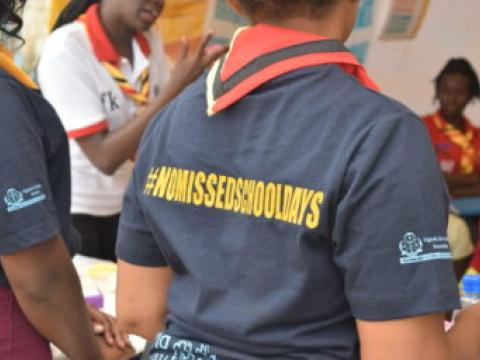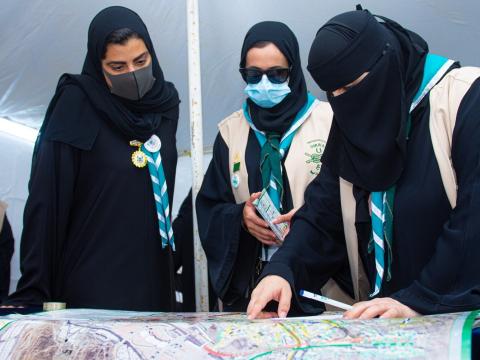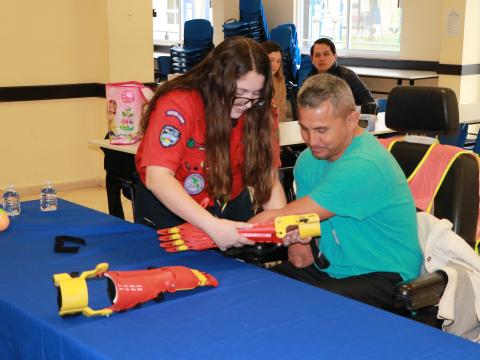Advancing Gender Equality through Scouting in Ethiopia
Ethiopia is a country of 109 million people, more than 50% of whom are women and girls. Their developmental outcomes are significantly constrained by unequal gender power relations, and the Scouts have decided to stand in the gap and be counted as champions for gender equality.
The Advancing Gender Equality through Scouting Project by the Ethiopia Scouts Association is doubling its efforts to make Scouting and communities more inclusive by valuing and promoting the diversity of communities through the development and implementation of policies and strategies on diversity and inclusion.
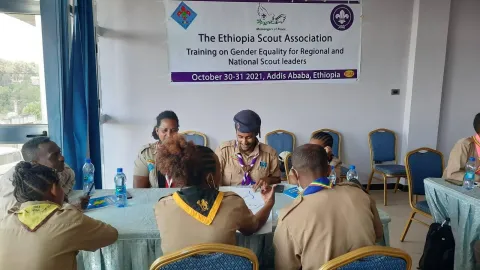
How Scouts Are Improving Gender Equality in Ethiopia
In Ethiopia, the Scouts realised that there is a negative perception that women and girls are of lower status or value than men and boys, and they recognized that this negative perception is the root cause of many poor health outcomes, rights violations, and deep-rooted poverty among girls and women.
That’s why they decided to improve gender inclusion and participation through gender equality training and education for their youth members and adults in Scouting, encouraging Scouts to think about gender issues and understand when and how they can act. This included increasing Scouts' commitment to the HeForShe campaign and supporting Scouts to implement local projects that help improve gender equality.
They trained 32 adult leaders and volunteers as trainers-of-trainers to become champions of change in diversity and inclusion and conduct gender equality assessments using the HeForShe Toolkit. With support from WOSM consultants, the Scouts formed a five-member team to develop the National Diversity and Inclusion Policy, translated it into local languages and disseminated it to all Regional Scout Councils.
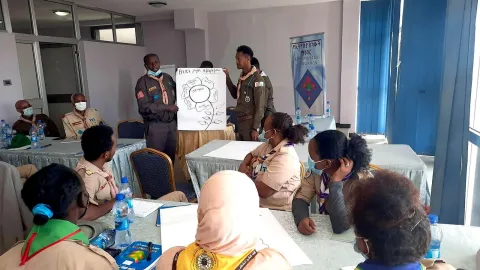
Besides developing the policy, the Association established within its national and regional structures a Diversity and Inclusion Committee which assisted in conducting an internal Gender Equality Self-Assessment and produced a report to guide its efforts towards becoming a more gender-neutral organization, with a commitment to address gender equality at all levels within its ranks where only 16% of women are involved in decision-making at the national level, despite an almost 50-50 gender parity in registered membership.
Thousands of Young People Trained in Diversity and Inclusion
In conjunction with local partners - especially schools - the education office and the women, children and youth office, a total of 1,280 patrols and School Club Leaders were trained on diversity and inclusion with an emphasis on gender equality in a series of cascaded trainings by the trainers-of-trainers. In the end, 26,240 school-going boys and girls were reached with 15,744 of them making a commitment to gender equality. The young people went on to train other young people in their local areas and become advocates for gender equality on social media and in their communities, ultimately enabling the project to indirectly reach another 78,720 young people and adults.
The diversity and inclusion training provided young people and Scout Leaders from nearly all regions (with the exception of Benishangul, Gumuz and Tigray) to build skills to tackle gender equality issues head-on. In conducting the training, the Association followed a strict gender participation rule that created equal opportunities for women and young girls. They also integrated games like “Diversity and Inclusion in Flower Petals” that helped participants easily understand diversity and inclusion concepts.
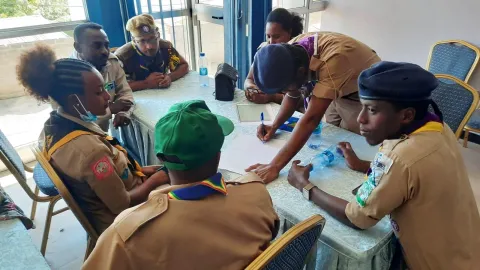
Consequently, 10,550 Scouts volunteered at least 1,920 hours of their time, bringing their skills and energy towards in service of their communities to help achieve the SDGs. Throughout this project, another 250 young people became Scouts and made a promise to create a better world.
Overcoming Barriers to Gender Equality in Scouting
Among the challenges faced by the Scouts in the implementation of the project was the inability to reach other parts of the country and conduct project activities due to the ongoing conflict in the northern part of the country. The lack of many well-trained resource persons in diversity and inclusion in the Association was also a challenge at the start, but through the project, they were able to train young people and adult leaders to support with following up on the activities.
Strategic Partnerships Supporting a Better World in Ethiopia
Support received from the government (Ministry of Women, Children and Youth, Ministry of Education and Regional Bureaus for Education, Women, Children and Youth Affairs) and non-governmental organization partners ActionAid Ethiopia, Ethiopian Youth Federation and Young Women Christian Association worked with Scouts to offer great support and visibility to their work and helped ensure a gender-balanced country and the overall sustainability of the project.
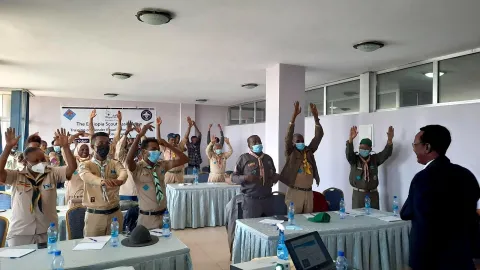
Looking Towards Palpable Change for All in Ethiopia
Through this project, the Ethiopia Scouts Association has demonstrated its commitment to addressing diversity and inclusion issues within its ranks and the community. By doing so, they hope to improve access to education and opportunities for girls and women while enhancing positive development outcomes in a nation where only 37% of parliamentary seats are held by women, and only 11% of adult women have reached at least a secondary level of education, compared to 22% of their male counterparts.
By becoming champions for gender equality and implementing a diversity and inclusion policy in its day-to-day activities across its structures, the Association aims to inspire Scouts and the Ethiopian populace to advocate for gender equality and commit to the HeForShe campaign and bring a long-lasting solution to ensuring diversity and inclusion in Scouting as well as the community.
Learn more about our work on Diversity and Inclusion on our website.
------
The project was implemented as part of the Scouts for SDGs global initiative, thanks to the longstanding support and partnership of Alwaleed Philanthropies via the World Scout Foundation. Scouts for SDGs enables young people with skills for life and empowers them to take the lead in community development efforts to support the achievement of the Sustainable Development Goals (SDGs).
